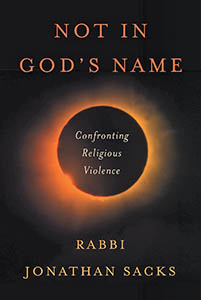
‘Not in God’s Name: Confronting Religious Violence (Schocken Books, NY 2015) 305 pp., ISBN: 978-0-8052-4334-5 $28.95
Rabbi Lord Jonathan Sacks is the leading public Jewish intellect of our times. His brilliant oratory, his contemporary rendering of classic Jewish thought into scintillating books, and his original interpretations of ancient texts, have cast him as a spokesperson for Judaism and Jewish values in a world gone amok. “Not In God’s Name” is his attempt to grapple with the current rise in violent killings based on religious beliefs. People have been killing each other for centuries in the name of religion. One might have hoped that in the 21st century such barbarism might have ceased. That it has not, and is in fact experiencing a resurgence, has generated this book.
Pascal’s observation that “men never do evil so completely and cheerfully as when they do it from religious conviction” is truer now than ever before. God weeps when men murder in His Name. The Hebrew Bible envisions a time when warfare will cease. Invoking God’s Name to justify violence is blasphemy. Religion as a political tool is sacrilege.
The banality of evil may have described the Nazis. Today’s zealots practice altruistic evil. Evil perpetrated in a sacred, idealistic cause. This 21st-century politicized religious extremism is not limited to Moslem fundamentalists. Today’s headlines demonstrate the globalization of various hatreds assisted in no small measure by the Internet.
Religious fervor grounded in fear, confusion, anxiety, pain, humiliation and loss leads to the dehumanization of the “other.” The God of compassion is lost in this emotion-laden miasma. What we share as co-religionists is replaced by what separates us. Sacks calls this pathological dualism. There is a cognitive breakdown and an inability to face complex realities. Fear and hatred animate the amygdala, the most primitive part of the brain, to a defensive reaction. Although religious violence appears in many regions of the world, our Semitic cousins seem to have taken hold of this approach and made it an article of faith.
Rabbi Sacks is a philosopher. As such he goes on at great length to analyze the roots of religious violence. He cites great thinkers from many disciplines—philosophy, sociology, history and psychology as well as the arts and sciences. He is well versed in a multitude of fields and all of this depth and breadth of learning is brought to bear on an analysis of the whys and wherefores of religious violence. He offers novel interpretations of Biblical texts, particularly the Joseph narratives, and has a felicitous style of writing. His vocabulary is dramatic and ebullient. The Jewish people, upon entering Israel, are described as an amphictyony—a loose federation of tribes led at times of emergency by charismatic figures known as judges.
Religion leads to violence when it consecrates hatred. After 13 chapters analyzing the roots of religious violence, the last two chapters offer no more than a kumbaya solution to this problem. Love your enemy, let go of the hatred in your heart and acknowledge that only God can mete out vengeance. Wars may be won with weapons but only ideas can win a peace. Terror is idolatry. The victims are the values upon which a free society are built. Honor God’s Name by honoring His image—humankind.
The analysis is most insightful. The solutions are not realistic nor workable. Maybe that’s the essence of the problem. “Religiously motivated violence must be fought religiously as well as militarily, and with passionate intensity, for this will be one of the defining battles of the twenty-first century.”
Dr. Wallace Greene has taught at Yeshiva University and Queens College, and writes and lectures on contemporary Jewish topics.
By Wallace Greene










